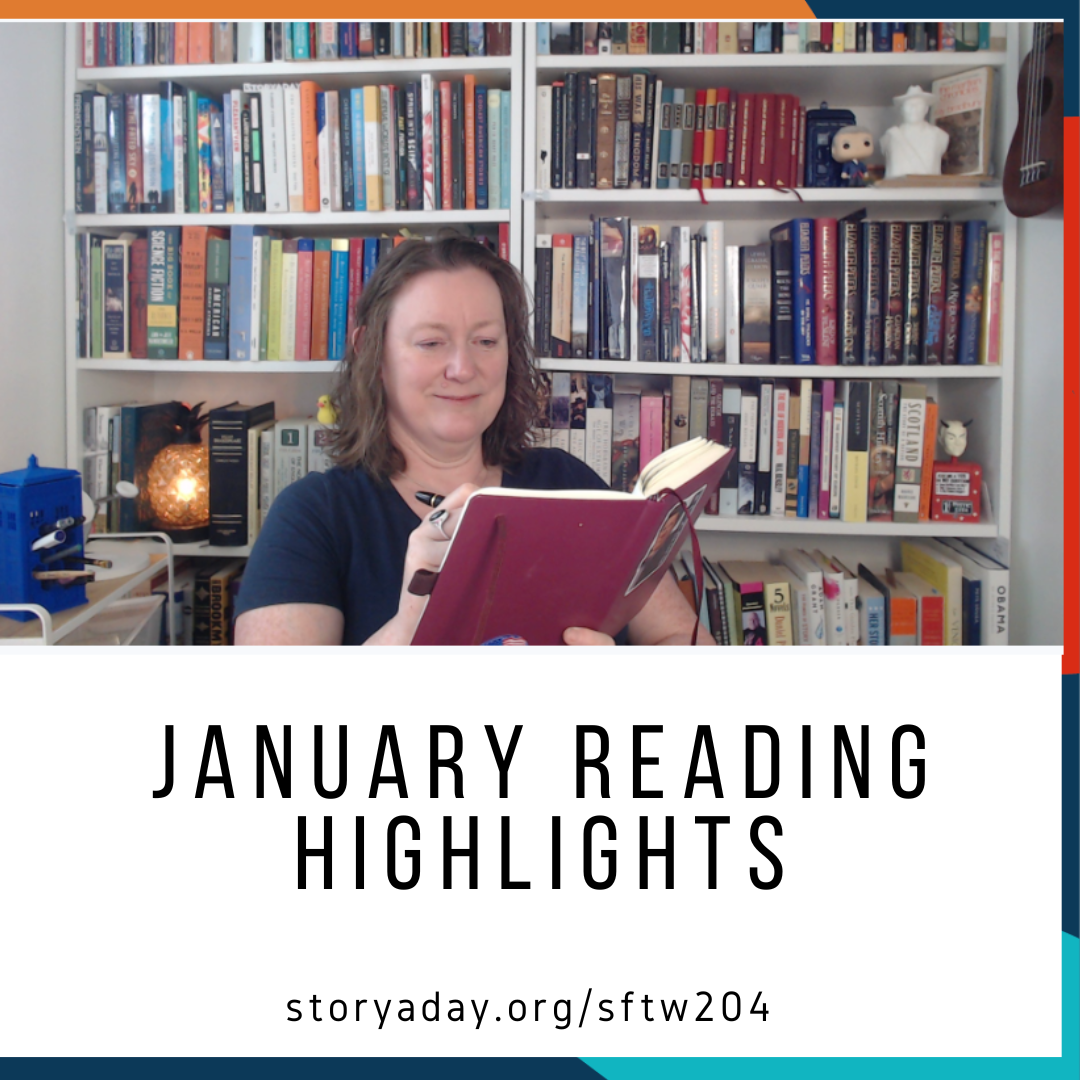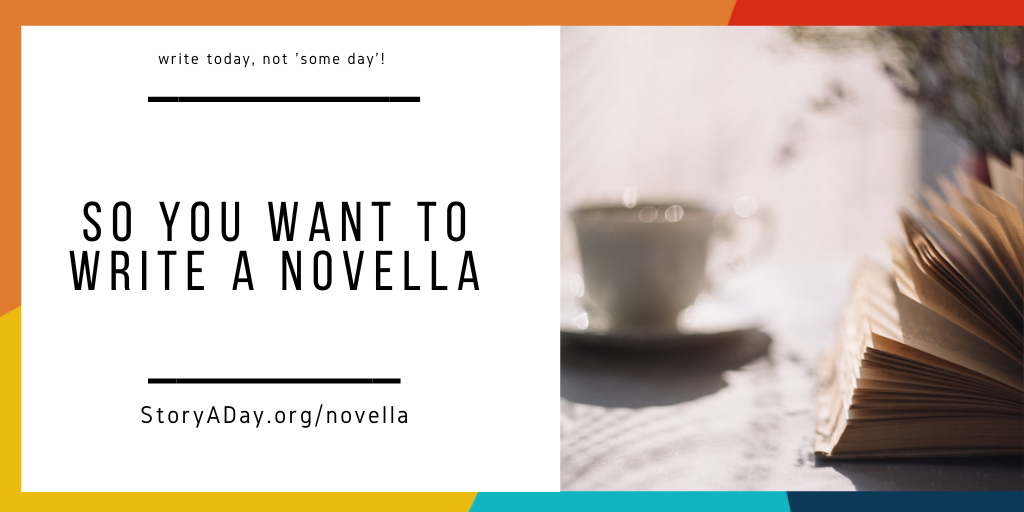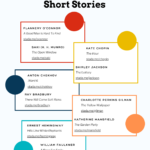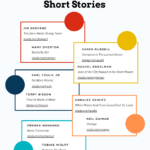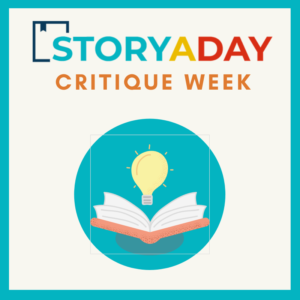One of my projects this year is to reconnect with the current state of the short story.
Because I’m interested in the form, I read a lot of short stories, but I’ve been doing it in a haphazard way.
But because another of this year’s goals is to submit more stories, I want to make sure I’m reading to what editors are buying and readers are enjoying now, not just what the professors say a short story should be.
How To Read A Lot of Short Stories
This year I’ve committed to reading A LOT of short stories and I’ve found a rhythm that I’m enjoying.
Mostly that means starting or ending my day with a short story or piece of flash fiction from one of the many collections on my shelves or one of the many online publications I otherwise forget to visit.
But I’m also going to strongly recommend another tack I’m taking: every time I pick up my phone to doomscroll, I either put it down and pick up a short story collection, or swerve the social media and news sites (and yes, I deleted the social media apps from my phone, which means I have to go to the browser if I really want to get my fix) and pull up an ebook collection or an online journal.
How Much Time To Allocate
Flash fiction takes almost no time to read – I’ll read one while waiting for the coffee machine to run or the kettle to boil for a nice cup of Lavendar Mint Tea
Short stories might take ten or twenty minutes to read – perfect for getting away from my desk, drinking the aforementioned coffee or herbal tea.
Sometimes I hate the stories. Mostly I don’t.
The trick, I’ve discovered, is knowing what you like.
Finding Stories You Like
The trick to that, sadly, is ploughing through a bunch of stories you don’t like.
Trial and error will teach you which editors, collections and journals tend to have stories you enjoy, and which have stories that frustrate you or leave you feeling bad.
Don’t love stories about trauma? It doesn’t mean you can’t appreciate good writing. It just means you don’t care to spend your break time being brought down.
Tips for finding anthologies you’ll love:
Follow authors you like on social media and when you inevitably break your self-imposed social media fast, look them up and find out what they’re recommending.
If an author whose writing you enjoy guest-edits an anthology, there’ a good chance you’ll like the stories they chose (this happened to me the year Anthony Doerr edited the Best American Short Story Collection, but it can also happen in reverse. I picked up a copy of the same collection from the year when Stephen King edited and was delighted to discover that he–an author I had never read, and had many preconceptions about–had excellent taste in fiction, which led me to reading and enjoying some of his writing too!)
Ask writing and reading buddies what they’ve read that they’ve enjoyed, lately.
Stories I Have Enjoyed from my January Reading List
‘Foreword’ by Jacqueline Freimor, Best American Mystery and Suspense 2023
Styled as a foreword to a newly-discovered novel by a lesser-known writer, and salted throughout with footnotes, this story was an absolute delight. (Things you should know: I love a footnote and I’m a sucker for stories that use weird formats like this and stories where the story that is really being told is not the story the narrator thinks they are telling). This was a sly and delightful story, with a hint of crime a crime to earn it a place in the ‘mystery and suspense’ collection, but the real mystery is the one the reader solves by reading between the lines.
‘The Song of a Non-Human Intelligence’, Mical Garcia, Strange Horizons
This short piece is a fantastic example of interesting science fiction, told from a non-human but accessible perspective. It taps into the current AI-everything zeitgeist but does it in an unexpected way. It’s also a great example of something I’m trying to learn about: science fiction that is not focused in colonialist and extractive norms (conquering planets, mining the universe for resources). In this story an AI is embedded in a whale embryo by human researchers who, it turns out, lack the scope to understand the whole whale experience. So the AI makes a plan….it was a lovely story, and a great advert for the importance of writers coming from more walks of life than the ‘I like writing, let me do an MFA and become a teacher’ route. (Nothing wrong with that, but give me a story by a biologist or an accountant or a land management specialist, from time to time, too!
Weight Room, Paul Crenshaw, Best Microfictions 2020
This was a great example of how very short fiction differs from the 4-6,000 word short stories you might be more familiar with.
It is impressionistic and immerses you in a moment and an environment…and then uses the ending to show you another layer to the story.
Elegantly done.
Ripen, Ashley-Ruth M. Bernier, Best American Mystery and Suspense 2023
This was a lush, lovely story with a light mystery element, that opens this collection and changed my whole expectation of what mystery/crime short fiction could be. In this story a food journalist returns to her parents’ home on St. Thomas to deal with some family and personal issues, and becomes tangentially involved in an island drama.
Take Me To Kirkland, Sarah Anderson, Best American Short Stories 2025
A coming of age story about a girl growing up–and apart from–her former best friend. It’s charming and terrifying and about something, but not self-pitying. The voice has that true teen self-absorption that comes from trying to figure out who you are. And the ending lands.
The Wif-Fi Womb, Avi Burton, Analog Nov/Dec 2025
This is a low-key, well told story about convenience and the dark side of our always-connected, always-monitoring societal trend. This one felt like it could be come (a terrifying) reality, next week.
Dominion, Lauren Acampora, Best American Short Stories 2025
This story captured the pampered ‘failing up’ nature of a former CEO in retirement, and the wife who hitched her wagon to his star and is now trapped with this one-dimensional fool, who threatens to wreck everything she’s built (he’s already alienated their daughter). In retirement Roy has decided to create a zoo of wild (and sometimes rescued) animals, and sees his hobby as somehow divinely ordained, and a benefit to humanity (of course he does). He invites his granddaughter’s kindergarten class to visit and, shockingly, in a zoo run by amateurs, disaster strikes. Roy’s response is as inept as you would expect. This was a vicious skewering, and I liked it 🙂
‘The Billionaires Are Having A Party’, Sage Tyrtle, Fractured Lit
This is flash fiction at its best. The billionaires of the title are deliciously awful, the story doesn’t preach, but it does illuminate, and the ending packs a wallop!
Sources for these and other stories I read this month
Best American Short Stories 2025 (Celeste Ng, Ed)
Best American Science Fiction and Fantasy 2025 (Nnedi Okorafor, ed)
Best American Mystery and Suspense 2023 (Lisa Unger, Ed)
All The Stories I Read (So Far) This Month
(No, I’m not reviewing them all…)
“Look at the Moon,” by Dominique Dickey (Best American Science Fiction and Fantasy 2025).
“The Forgetting Room,” by Kathryn H. Ross (Best American Science Fiction and Fantasy 2025).
“An Ode to the Minor Arcana in a Triplet Flow,” by Xavier Garcia (Best American Science Fiction and Fantasy 2025).
“The Weight of Your Own Ashes,” by Carlie St. George (Best American Science Fiction and Fantasy 2025).
“Bots All The Way Down,” by Effie Seiberg (Lightspeed Magazine; Lightspeed Magazine).
“Nine-one-one,” by Sarah Freligh (Welkin Stories; MattKendrick.co.uk).
“Pattern,” by David Anson Lee (Welkin Stories; MattKendrick.co.uk).
“John,” by Petra Marteleur (Welkin Stories; MattKendrick.co.uk).
“A Unique Case,” by Alasdair Gray (Every Short Story, Alasdair Gray).
“Flip Lady,” by Ladee Hubbard (Best American Mystery & Suspense 2023).
“Chalice,” by James L. Cambias (Analog, Nov/Dec 2025).
“Academic Neutrality,” by M. R. Robinson (Lightspeed Magazine).
“Earth’s Last Library,” by James Van Pelt (Analog, Nov/Dec 2025).
“Jumper Down,” by Don Shea (Flash Fiction Forward).
“Stories,” by John Edgar Wideman (Flash Fiction Forward).
“Eros, Philia, Agape,” by Rachel Swirsky (The Best Science Fiction and Fantasy 2010).
“Truth and Bone,” by Pat Cadigan (Best Science Fiction and Fantasy of the Year, Vol. 4, Jonathan Strahan (ed.), 2010).
“Stairs for Mermaids,” by Mm Shrieir (Flash Fiction Online).
“Home Is The Hunter,” by James A. Hearn (BAMS 2023).
“Foreword,” by Jacqueline Freimor (Best American Mystery and Suspense 2023 ).
“The Mayor of Dukes City,” by S. A. Cosby (Best American Mystery and Suspense 2023 ).
“The Song of a Non-Human Intelligence,” by Michal Garcia (Strange Horizons;).
“New York Blues Redux,” by William Boyle (Best American Mystery and Suspense 2023 ).
“Weight Room,” by Paul Crenshaw (Best Microfictions 2020).
“New York Blues Redux,” by William Boyle (Best American Mystery and Suspense 2023 ).
“Linger Just A Little Longer,” by V. Astor Solomon (100 Foot Crow).
“The Horses Are Ready and They Need to Go,” by Christopher Citro (Best Microfictions 2020).
“Ripen,” by Ashley-Ruth M. Bernier (Best American Mystery and Suspense 2023 ).
“The Billionaires are Having A Party,” by Sage Tyrtle (Fractured Lit).
“Currents,” by Hannah Bottomy Voskuil (Jerry W. Brown’s site).
“Take Me To Kirkland,” by Sarah Anderson (BASS 2025).
“Dominion,” by Lauren Acampora (Best American Short Stories).
“One Tick,” by Joel Wright (100 Foot Crow).
“The Red Zone,” by Jennifer Galvão ( The Rumpus).
“The Wi-Fi Womb,” by Avi Burton (Analog, Nov/Dec 2025).
“The Grand AM,” by Tyler Barton (Best Microfictions 2020).
“Persephone Rides at the End of Days,” by Carmen Maria Machado (Selected Shorts 2026-01-05).
“Space Is Deep,” by Seth Chambers (Clarkesworld 232).
“The Desolate Order of the Head in the Water,” by A. W. Prihandita (Clarkesworld 232).
“Down We Go Gently,” by M. L. Clark (Clarkesworld 232).
“What to buy your husband of thirty-seven years for his birthday,” by Jay Mackenzie (Flash Fiction Online).
“The stars you can’t see by looking directly,” by Samantha Murray (Clarkesworld 232).

